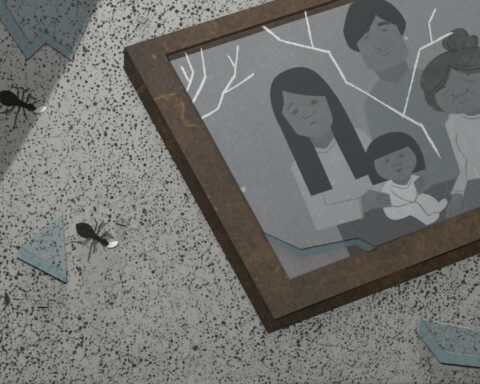This year’s insanely long awards season is finally over. For the documentary crowd, the Oscar race basically begins at Sundance a full year before the show. This year, however, the pandemic means that we’ve been tracking contenders for sixteen months with Sundance hits like Crip Camp, Time, and The Mole Agent sustaining their buzz since January 2020. Collective, meanwhile, which debuted at TIFF 2019, has been in the race for 20 months. All the nominees deserve a round of applause and some well-deserved rest.
This year’s race includes five features drawn from one of the strongest 15-title shortlists in recent memory. Admittedly, though, films that made that shortlist might be better than the ones, which made the final five. Dick Johnson Is Dead, Boys State, MLK/FBI, Notturno, Welcome to Chechnya, Gunda, The Truffle Hunters, 76 Days, and The Painter and the Thief all have their own merits. They’re also without equals, whereas some docs that Oscar favoured (cough, cough, Crip Camp and The Mole Agent) are mostly there because of their subject matter. The voters of the documentary branch continually seem to miss the memo about exciting films that reinvent the art form.
Now that Oscar voting is officially closed, here are the films vying for Best Documentary Feature and Best Documentary (Short Subject) at the Oscars this year. -PM
Best Documentary Feature
Let’s start with a look at the five nominees.
Collective
Investigative docs that uncover scandal and corruption among the elite always play well with audiences and critics. Many feel that’s what documentaries should be, that fighting for underdogs and exposing social and political ills, is truly the mission of journalists and non-fiction filmmakers. That may be why Collective, a tough barebones documentary out of Romania has garnered praise around the world. As a doc lover, I find it immensely appealing in an old-fashioned way. What’s most powerful about it is its narrative, which many may not know.
Collective is about the exposure of corruption in Bucharest’s hospitals and its federal government but the story starts with a fire, which took place in a club called Colectiv, killing 27 young people and injuring 180 others. Footage of the panic, which ensued once the fire began, is terrifying enough but what happened was far worse. Within a couple of months, there were 37 more deaths, mainly from bacterial infections brought on while patients were in hospital.
Journalists began to scrutinize what happened and soon discovered that the main disinfectant being used to treat the young fire burn victims had been diluted to about 10% effectiveness. One journalist, Cătălin Tolontan, was able to place the blame on Hexi Pharma, a medical supplier that had been selling ineffective products to the hospitals for years. The Minister of Health resigns the big Pharma boss is exposed and then mysteriously dies in a car accident and the Social Democratic party loses the election.
Just when Western audiences and critics—including me—were ready to proclaim Collective the East European version of the Watergate classic, All the President’s Men, a third act takes place. And it’s devastating. Working with the new government’s Minister of Health, Tolontan and other journalists discover that the corruption continues and is deeply embedded in Romania’s hospital system. The new Minister quits, his government folds and the Social Democrats return to power.
Collective is a no-nonsense film about politics, corruption and media-makers who care about the world. But can it change anything in Romania or the world? —MG
– available on Hoopla, Neflix, and VOD (various platforms)
Crip Camp
A true crowd-pleaser if there ever was one, Crip Camp began an impressive run with an Audience Award at Sundance 2020. It’s exactly the kind of work that wins audience plaudits. That’s not a slight, mind you, since the film is a genuinely upbeat and inspiring doc that makes notable headway for representation both on screen and behind the camera. Crip Camp is a rousing portrait of the fight for the rights of people with disabilities in the USA, told through an impressive range of archival material that transports audiences to Camp Jened, an idyllic retreat where people with disabilities became empowered by gathering with others who shared their experiences. The film is conventionally and handsomely assembled, with impressive work in the editing and sound departments, making for accessible viewing. Netflix pushed Crip Camp quite aggressively from the moment the Academy’s virtual screening rooms opened.
The early campaign probably helped since Netflix released tons of films after Crip Camp that are more or less the same. While the streamer has changed the game for documentary, including releasing the exceptionally crafted and boldly engaged Oscar winner American Factory, which, like Crip Camp also had the Obamas behind it, there is a palpable restlessness within the doc community about the homogeneity of Netflix content. It’s become virtually indistinguishable to the point that films now seem parodic. On the other hand, Crip Camp surprisingly won one of the doc field’s biggest prizes—the IDA Award for Best Feature—over nine films that arguably did more to advance the art form. Perhaps this formula doesn’t bother the filmmakers as much as it bothers the critics, but this critic says that Crip Camp, while a very pleasant film, hardly deserves to be called the best. – PM
– available on Netflix
The Mole Agent
For me, The Mole Agent is the anomaly on the list. From the moment the doc debuted at Sundance 2020, people debated the film’s merits as a non-fiction work. Much of the film, which sees octogenarian Sergio infiltrate a retirement home to report on elderly care, is clearly staged, re-created, or presented out of context. Although there is a crew that accompanies Sergio under the guise that it’s making a doc about retirement living, the footage is suspect. There are fluid shot/reverse shots and impressive coverage of scenes that one simply can’t get with a small team, or at least without influencing the action. Re-enactments and dramatization in documentary are commonplace, and totally fine in my estimation, but films should be more transparent in their construction.
It’s surprising that this film by Maite Alberdi is a nominee when the doc branch traditionally votes quite conservatively. Films that use dramatic re-creations as part of their device are among the Oscars’ most notorious “snubs,” like Stories We Tell and The Thin Blue Line, and those films used dramatic license to reframe one’s perception of documentary itself. On the other hand, even the people who take issue with The Mole Agent’s liberal designation as “documentary” don’t really seem to care. The film ultimately delivers a tender and compassionate message about loneliness and respect for the elderly. It is, admittedly quite funny to see the residents speculate about the documentary being shot in their midst. The inconsistencies in the film raise questions about how things can be much different than they appear. – PM
– available on Hoopla, Hot Docs at Home, Kanopy and VOD (various platforms)
My Octopus Teacher
Netflix could win back-to-back Oscars with My Octopus Teacher. This film is a dazzling underwater adventure as Craig Reed goes diving to cure his depression and befriends an octopus. Through daily check-ins with the cephalopod, Reed learns to slow down and understand his environment. Without anthropomorphizing the octopus, the film creates a sense that Reed and the animal have a genuine relationship. The footage is also a joy to watch, particularly the thrilling hunting scenes in which the octopus chases a crab and a lobster. (I’m already drooling at the prospects for a seafood grill platter that my cat and I will have in the film’s honour on Oscar night.)
My Octopus Teacher is a rare doc that made the cut without any festival play. It was among the films announced as 2020 Hot Docs selections, but it didn’t screen in the festival’s virtual edition. It simply appeared on Netflix with little fanfare in September—in the middle of TIFF, no less—and established itself as a word of mouth hit. People genuinely respond to this film. The awards season reflects this sentiment in the fact that My Octopus Teacher is the only doc to score nominations at key Oscar precursors, like the Directors Guild of America Awards, the Producers Guild of America Awards, the Critics’ Choice Awards, American Cinema Editors Awards, and the BAFTAs. It won the PGA, ACE, and the BAFTA, which have considerably more overlap with the general Oscar voting body than the critics’ groups that have favoured the film’s competitors. Many of us clearly underestimated it. – PM
– available on Netflix
Time
In this age of Black Lives Matter, a film like Time would be embraced if all it did was simply tell the story of a single mother fighting to raise her kids while her husband was serving an impossibly long jail sentence. Garrett Bradley’s complex and emotional feature documentary—my Oscar favourite—does far more than that: it’s an intimate character study, a fierce condemnation of the racist prison system in the U.S. and a philosophical meditation on the meaning of time.
Much of the footage in Time was shot as personal videos, at home or in the car, for her husband Robert by Fox Rich aka Sibil Fox Richardson, as mementos of how their six boys progressed towards manhood without him. It’s quite powerful to see the youngest, the twins Justus and Freedom, literally from the womb as Fox shot footage of herself pregnant with them, through being kids with their brothers playing as boys do, to them as young men, finally being with their father, free at last.
Bradley has a great rapport with Fox, who has matured radically over the past two decades, from a quiet, very young woman, overwhelmed with responsibilities as a mother and breadwinner to the vibrant strong person she is today. Fox has become a brilliant speaker whose voice is powerful and resonant as she condemns the system she endured for decades, which incarcerates nearly one million Blacks, mainly men, representing nearly 40% of prisoners in the U.S. despite only being 13.4% of the population.
Perhaps most extraordinary is Bradley’s sensitive editing, which moves seamlessly through Fox’s footage, providing a portrait of a family, loving and enduring a tough life for years. All of film is about time, and Garrett Bradley has skillfully made us experience it with Fox and Robert and their children. This is a terrific film—one for the ages, not just for Oscar.—MG
– available on Amazon Prime
Will win
Pat says: My Octopus Teacher. It’s not the critical favourite by any measure — that honour is clearly shared by Collective and Time — this doc is the one that hit all the stops in a hugely competitive year. It’s technically accomplished, accessible, heartfelt, and entertaining—a genuinely moving work about our relationship with and responsibility to the animals of this planet.
Marc says: Time will win the Oscar, hands down. Not only is it the best doc of the year aesthetically, but it is also the perfect film for this year of George Floyd and Black Lives Matter. Garrett Bradley has made a film that encompasses racism, the penal system, the family and the concept of time. I am eagerly anticipating Garrett Bradley’s acceptance speech.
Should win
Pat says: Don’t get me wrong. I really like My Octopus Teacher and the underwater cinematography delights, but Le monde du silence won this prize over 60 years ago. For me, it’s a toss-up between Collective and Time. The former is a thrilling example of the fine line between documentary and journalism at a moment when news integrity matters more than ever. The latter is a poetic, intimate, and heartfelt evisceration of America’s mass incarceration system and its effect on families. If pressed to cast a ballot, I raise my hand for Time with deep respect for director Garrett Bradley’s commitment to her subjects. This longitudinal study powerfully conveys the devotion of a family in it for the long haul and captures their growth throughout the difficult journey.
Marc says: I’m happy with Time winning—and will be really unhappy if it loses.
Should have been there
Pat says: Boys State should have won this race in a landslide. In an outstanding year for documentaries, this doc by Jesse Moss and Amanda McBain stood tallest for its scope, craftsmanship, and bold interrogation of America’s deeply polarised political system. I am also very sad that The Truffle Hunters isn’t nominated, as I would have loved a spread of truffle cheese and truffle chips at my Oscar party. Swap out The Mole Agent for Gunda, too, and the party could have some well-deserved bacon.
Marc says: Although I’m not a vegan, just a mere pescatarian, I am sorry that Gunda didn’t at least make the final five in the doc sweepstakes. Director Victor Kossakovsky immerses us in a barnyard tale, which stars only chickens, cows and pigs in a fecund if somewhat neglected farm. There’s a delightful innocence to much of the film although Kossakovsky refuses to create a Disney product: there’s no music, everything is in seen in black and white and, of course, there isn’t any narration. But there is a story and a devastating one at that. Though we are spared the sight of any violence, the ending is heart-rending as the experience of a mother’s loss is shown clearly on the screen. Kossakovsky refers to Gunda as his Meryl Streep and whether what we see is absolutely real or somewhat manipulated by this master director, there’s no getting around the film’s emotional impact.
The Short Docs
The nominees:
The short docs are all available through Hot Docs at Home and where noted.
Colette: Nonagenarian Colette Marin-Catherine makes a pilgrimage to Germany to remember her brother who died in a labour camp just three weeks before it was liberated at the end of World War II. The doc is a touching portrait of a war hero and the ghosts she carries. (Watch)
A Concerto Is a Conversation: Two generations of family members are at their best in this poignant doc from Halifax native Ben Proudfoot and Green Book composer Kris Bowers. The film features Bowers in conversation with his grandfather, who shares sage wisdom about why Black men should proudly own their place in America. (Watch)
Do Not Split: An incendiary piece of journalism and pulse-pounding feat of filmmaking, this on-the-ground and in-the-moment doc captures the fight for democracy in Hong Kong as protests wage and then assume new significance under the pandemic. Directed by Anders Hammer and produced by former Hot Docs programming director Charlotte Cook. (Watch)
Hunger Ward: Director Skye Fitzgerald observes the fight against food scarcity and starvation in Yemen. The film is not an easy watch, but it chronicles heroes in the struggle as nurses in two feeding centres commit themselves to saving lives in a country at the brink of famine.
A Love Song for Latasha: This Netflix short offers a poetic and experimental celebration of the life of Latasha Harlins, who was tragically murdered in 1992 at the age of 15 while trying to buy some orange juice. Director Sophia Nahli Allison rewinds images from the past as Latasha’s friends speculate about a life that could have been. (Watch.)
Will Win
Pat says: I think it’s a tough call between Concerto and Latasha. The short doc category seems to be one in which Academy members consistently vote for the times, at least in recent years, so I can’t imagine anything else winning after Black Lives Matter defined so much of 2020. Experimental docs rarely triumph and the Oscars favour convention, so I think Latasha will fall a few votes short of the win. The category is one of the tougher calls of the night overall, but I predict A Concerto Is a Conversation to win the prize for its sweetly composed and inspiring multi-generational portrait.
Marc says: I agree with Pat’s analysis. This is a BLM year and Latasha, though quite artful and emotional, is too avant-garde for the Academy’s voters. The very nice and somewhat mainstream Concerto is the winner in my opinion, too.
Should Win
Pat says: Concerto would be my second choice, as happy as I’ll be when the home team wins on Oscar night. My vote goes to Do Not Split. It simply operates at a higher level than the other nominees do, and bears the sweat of its intense shoot. The film gets into the thick of the action with the camera scurrying alongside protestors in the war for democracy. This is exactly the kind of filmmaking—an informative work of journalistic rigour that’s also electrifying cinematically—that deserves to be rewarded.
Marc says: Once again, I agree with Pat. I was very impressed by Do Not Split but this isn’t the right year for it to win the Oscar.
Should have been there
Pat says: I was disappointed when Toronto’s Tiffany Hsiung didn’t make the Oscar shortlist for Sing Me a Lullaby. After winning honours from TIFF, DOC NYC, and the Directors’ Guild of Canada, Hsiung’s heartfelt portrait of her mother’s journey deserved recognition. She really is one of the most exciting rising talents on the Canadian film scene.
Marc says: To be honest, I wouldn’t have picked anything but Pat’s selection of Sing Me a Lullaby resonates with me. Happy to agree with a strong Canadian doc.
The Oscars air on Sunday, April 25 on CTV at 8:00 PM.













